Intel Z77 Motherboard Review with Ivy Bridge - ASRock, ASUS, Gigabyte, and MSI
by Ian Cutress on May 7, 2012 7:40 PM EST- Posted in
- Motherboards
- MSI
- Gigabyte
- ASRock
- Asus
- Ivy Bridge
- Z77
LAN Speed Test
LAN Speed Test is a freeware program designed for testing the network connection between two PCs on a home network. The speed of the transfer is limited by the lowest common denominator on the network, so if you have gigabit Ethernet capable computers but a 100 Mbit capable router, you are limited to 100 Mbit transfer. Note that this is really a formality – if a network port is rated at 1 Gbps, then chances are that it might hit at least 90+% of this value. The main test here is CPU usage, and how much is offloaded by the controller. For this test, we use LAN Speed Test to transfer a 1000 x 1 MB files across a home network with a 1 Gbps lowest common speed to the same machine each time, in a read/write scenario. Results are taken as peak speeds from several runs.
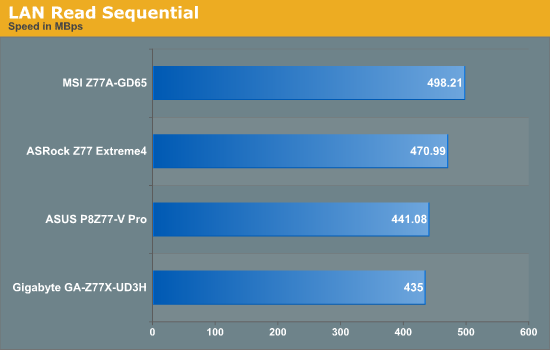
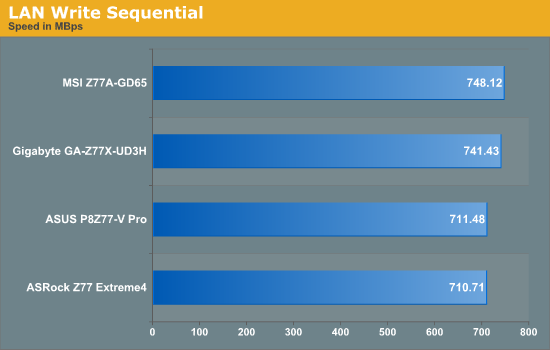
USB Speed
For this benchmark, we run CrystalDiskMark to determine the ideal sequential read and write speeds for the USB port using our 240 GB OCZ Vertex3 SSD with a SATA 6 Gbps to USB 3.0 converter. Then we transfer a set size of files from the SSD to the USB drive using DiskBench, which monitors the time taken to transfer. The files transferred are a 1.52 GB set of 2867 files across 320 folders – 95% of these files are small typical website files, and the rest (90% of the size) are the videos used in the Sorenson Squeeze test.
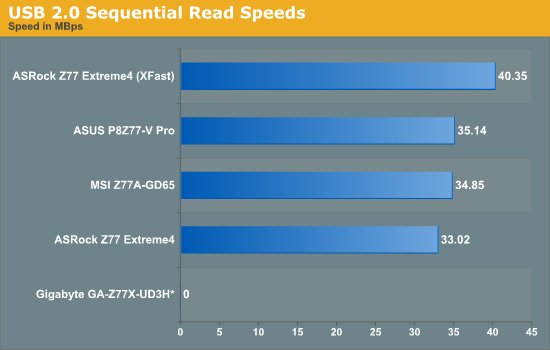
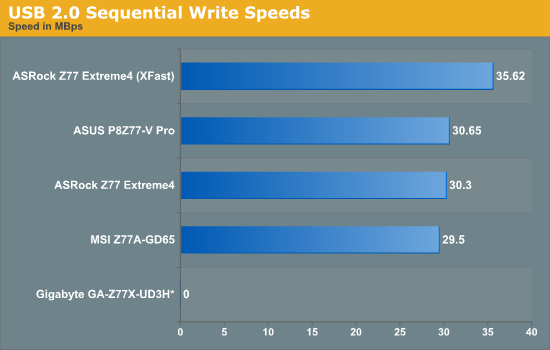
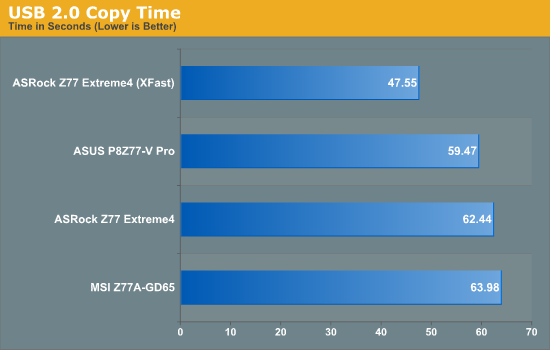
Due to the lack of Gigabyte USB 2.0 back panel ports, no results for the Gigabyte board were able to be fairly taken. In comparison, the XFast result from ASRock seems to speed ahead of the others.
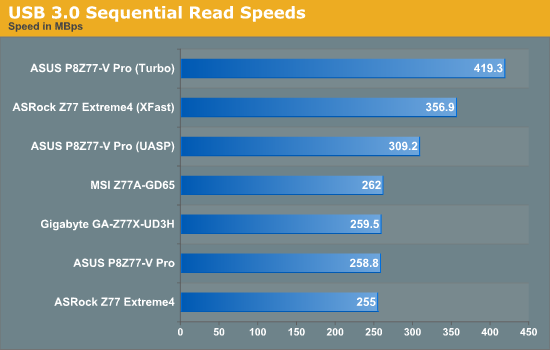
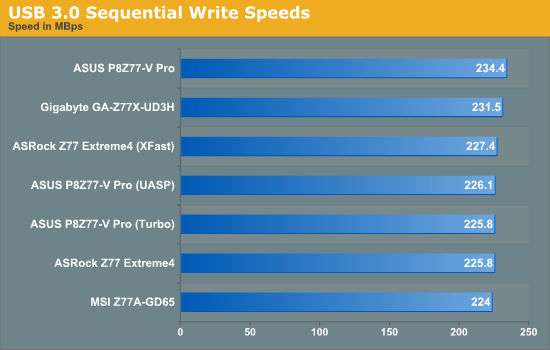
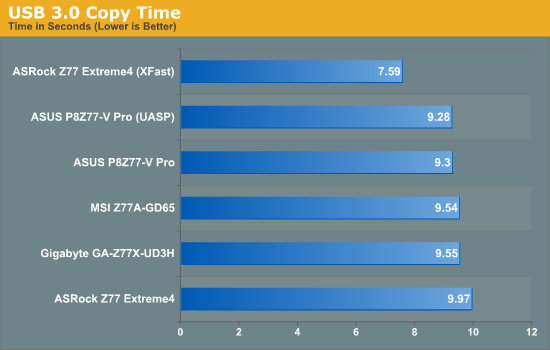
As this test deals with incompressible data at a Queue Depth of 1, UASP makes a difference in read but not in write. The adaptations performed by XFast are clear to see at this level.
SATA Testing
We also use CrystalDiskMark for SATA port testing on a C300 drive. The sequential test (incompressible data) is run at the 5 x 1000 MB level. This test probes the efficiency of the data delivery system between the chipset and the drive, or in the case of additional SATA ports provided by a third party controller, the efficiency between the controller, the chipset and the drive.
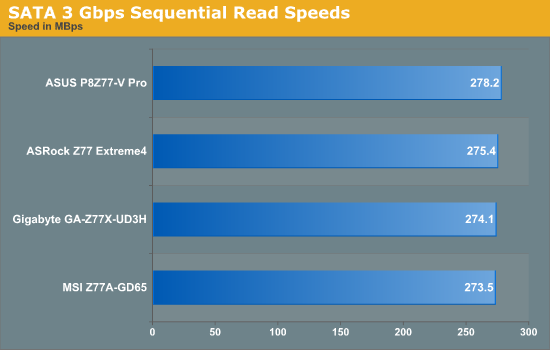
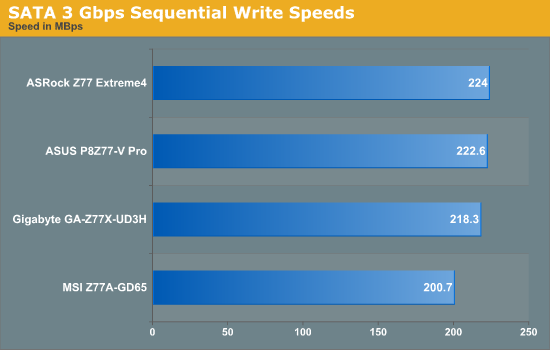
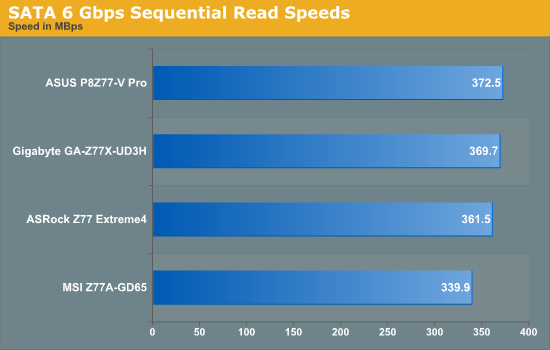
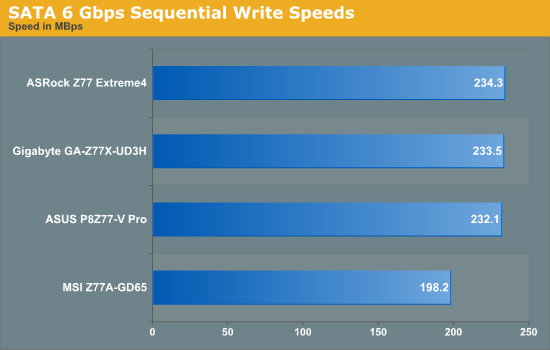
The MSI board seems to come out last in all our SATA testing.
DPC Latency
Deferred Procedure Call latency is a way in which Windows handles interrupt servicing. In order to wait for a processor to acknowledge the request, the system will queue all interrupt requests by priority. Critical interrupts will be handled as soon as possible, whereas lesser priority requests, such as audio, will be further down the line. Therefore, if the audio device requires data, it will have to wait until the request is processed before the buffer is filled. If the device drivers of higher priority components in a system are poorly implemented, this can cause delays in request scheduling and process time, resulting in an empty audio buffer – this leads to characteristic audible pauses, pops and clicks. Having a bigger buffer and correctly implemented system drivers obviously helps in this regard. The DPC latency checker measures how much time is processing DPCs from driver invocation – the lower the value will result in better audio transfer at smaller buffer sizes. Results are measured in microseconds and taken as the peak latency while cycling through a series of short HD videos - less than 500 microseconds usually gets the green light, but the lower the better.
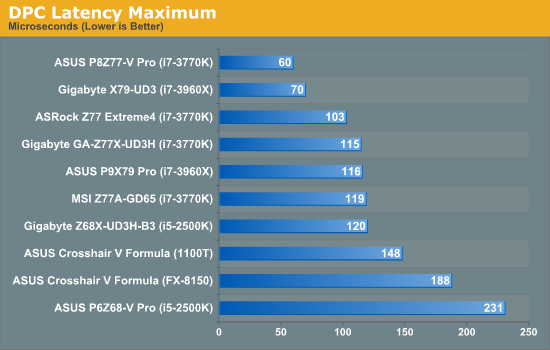
All the motherboards using Ivy Bridge chips do particularly well in our DPC test (as you would expect), with all boards coming in at under a very respectable 120 microseconds. The ASUS goes one step further with our lowest DPC score ever at 60 microseconds.










117 Comments
View All Comments
ggathagan - Thursday, May 10, 2012 - link
Yeah, we got your rant the 1st time around and didn't care about it then, either.JSt0rm01 - Thursday, May 10, 2012 - link
If you don't have anything to add to the conversation then maybe you should stfu. Its a perfectly fine place to discuss the slowing release schedules of desktop hardware and I don't think you, as a random internet name, are in any position to say what others care or don't care about. You aren't special.-------------
Also, after being a member of the anandtech forums for 10 years I was permanently banned by the moderators there because they wanted to censor a website (ffdt.info) that had conversation that was critical of their moderation. I find that the free flow of all information on the internet is critical. For a tech website such as this to limit the flow of information is offensive the core of these beliefs and its all because certain people in positions of illusory power deem that information detrimental to their positions.
bji - Thursday, May 10, 2012 - link
I think he was referring to the 'signature' that you are putting after every post. You know, the stuff after the dashes. With all respect, if you are going to put that in every post you're going to have to expect some flak from people who don't like when others try to make a statement. Not saying that I have a problem with it, but there are people who get pissed off about every little thing ...JSt0rm01 - Thursday, May 10, 2012 - link
well then let him be pissed. Thats my sig and if he wants to see it less then he shouldnt be responding to me.-------------
Also, after being a member of the anandtech forums for 10 years I was permanently banned by the moderators there because they wanted to censor a website (ffdt.info) that had conversation that was critical of their moderation. I find that the free flow of all information on the internet is critical. For a tech website such as this to limit the flow of information is offensive the core of these beliefs and its all because certain people in positions of illusory power deem that information detrimental to their positions.
Paapaa125 - Friday, May 11, 2012 - link
I don't understand why this site even accepts such a long sig. Stupid.smalM - Tuesday, May 8, 2012 - link
Black connectors on black boards - I really hate it.Where are the boards for grown-ups?
TGressus - Tuesday, May 8, 2012 - link
Not black enough if you ask me. Caps could be all Hi-c, silk screening ever single component should just stop, the branding could be black and UV reactive.Worst is all that silver metal that connects the chips/sockets. Black that!
embeddedbill - Tuesday, May 8, 2012 - link
Thunderbolt is curiously missing, more than a year after the apple intro. Some compelling features if price and vendor support don't drive you mad. Time can solve both those problems, I'm just not sure how flexible the implementation will be in a Windows environment, i.e. hot plug of performance hardware, and discrete video card integration of its display port out with the TB pcie lanes.Scarce details exist which makes me wonder if this tech will eventually wind up as overpriced fringe apple only, read FireWire!
kenyee - Tuesday, May 8, 2012 - link
Probably something a bit too bleeding edge for you guys, but Gigabyte has apparently figured out how to make it painless for setting up a Hackintosh w/ their UEFI BIOS:http://teksyndicate.com/news/2012/04/24/best-mothe...
Zoomer - Tuesday, May 15, 2012 - link
Hmm, that might be the reason for their weird phy choices.